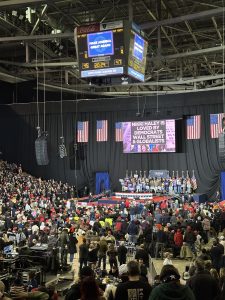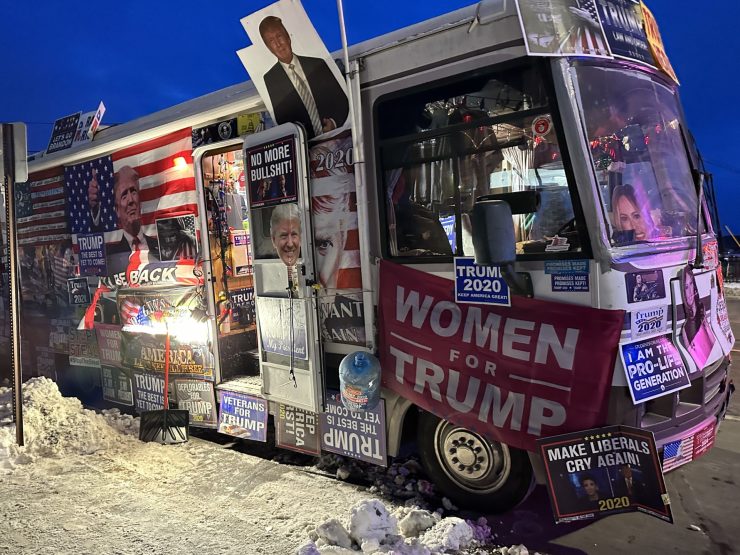By Abby Turner
MANCHESTER N.H. – Voters in the Republican presidential nominating contests disagree over whether presidential immunity claims should dismiss the felony indictments that former president Donald J. Trump is facing.
Trump repeatedly said the powers of presidential authority should protect him from criminal prosecution in the election subversion case, even though he is no longer president. He is currently facing 91 felony charges in four separate cases related to attempts to overturn the 2020 election, involvement in the Jan. 6 insurrection, hush money payments and withholding classified documents.
“This is not just me but all presidents. They have to be given immunity; otherwise, they will be unable to act,” Trump said at a Jan. 20 rally in Manchester, New Hampshire.

Charles Bradley, 75, a voter in this state’s first-in-the-nation primary, agreed with Trump’s claims on presidential immunity.
“I think that when the president makes a decision in his official capacity, that he has to consider the national interest, and those decisions should be immune from interference by the judiciary, or anybody else,” Bradley said.
Max Abramson, 47, said Trump should have immunity because the multiple cases brought against him are politically motivated.
“The Biden-Harris administration and the Democrats in Congress are the people who have really, really been going after him,” the former New Hampshire state representative said.
Some supporters of Nikki Haley, the former ambassador to the United Nations, said that as a U.S. citizen, Trump should not be immune from criminal prosecution. Ezra Wang, a New York student supporting Haley’s campaign, said there’s “clearly a reason” for the investigations into Trump.
“I think that, you know, just because you were president or you have a position doesn’t mean that you’re exempt from things that all the other Americans have to deal with,” Wang, 17, said.
Mike Butka, 70, is worried future presidents would “do whatever they want” if a precedent is set by excusing Trump’s legal cases.
“What if Biden decides he doesn’t want to leave office in January? I mean, we’re starting all over again, the same old stuff, but I think that you can’t give them any because they’d just let everyone go on a free-for-all when they’re president,” Butka, a resident of Merrimack, New Hampshire, said. A Harvard CAPS/Harris Poll of registered voters conducted online in mid-January found that support for Trump’s presidential immunity defense over his role in the Jan. 6 insurrection diverged among party lines.
Among Democrats, 70 percent polled said Trump should not have immunity for his actions on Jan. 6, while 75% of Republicans said he does have immunity.
Jacqueline Gaudet, 59, said the question was not over whether immunity should apply since she said Trump is already innocent of the charges.
“Well, I think they’re just grasping straws, you know, and it’s nothing really,” she said of officials who charged Trump in four separate cases.
A federal appeals court is still deciding whether presidential immunity can dismiss Trump’s federal election interference case. While the court decides, other voters want more regulation over what would qualify as presidential immunity in the future.
Richard Boddie, 50, said the indictments against Trump are politically motivated. But looking at the concept of presidential immunity, he said, “It needs to be done thoughtfully.”
“The only way to do it is you would have to have a body of people such as our House of Representatives and our Senate to be able to get together, look at the facts and say, ‘OK, maybe.’ But, you know, it depends. Everything can be politically motivated. So, I think that it’s a really, really difficult thing,” he said.















Add comment